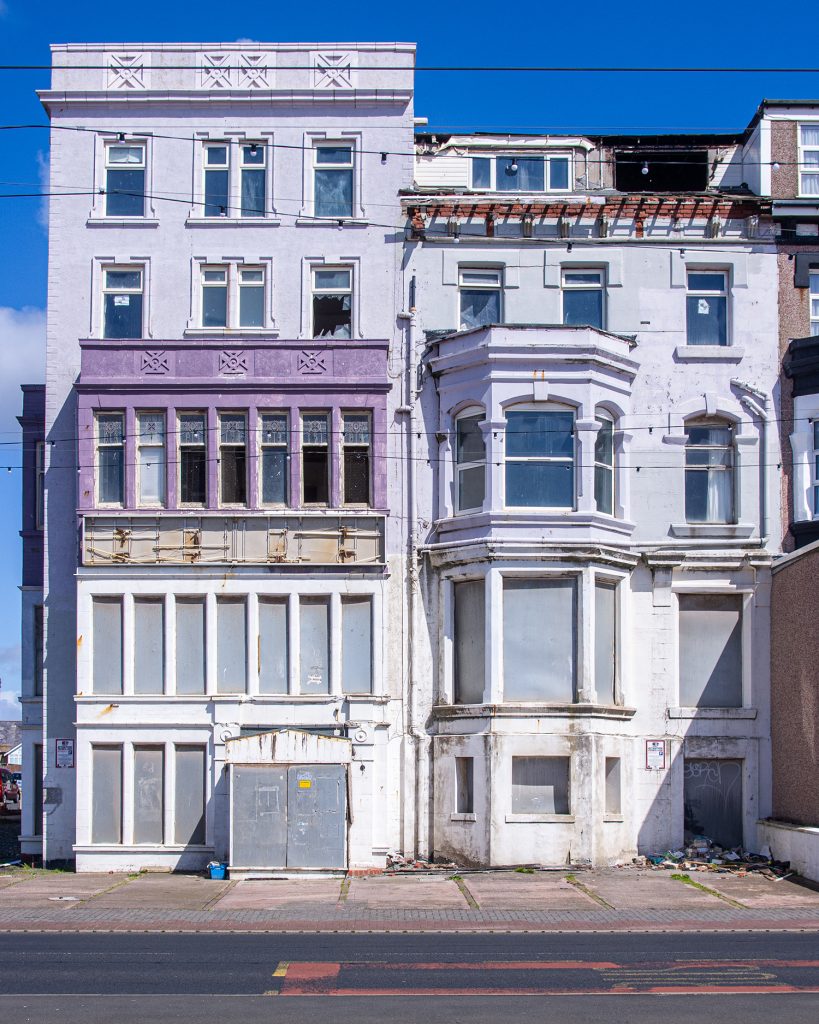Blackpool has become the poster child for seaside town deprivation. But while there’s no doubt that it’s down-at-heel – the last deprivation index found the Lancashire resort had eight of the UK’s ten poorest areas – it is still full of fight. Architect David Cox, co-founder of Preston-based David Cox Architects, is designing three schemes in the town, and describes it as a place that ‘believes in itself’.
The town has already been on its own levelling up crusade for years now. Blackpool City Council is tackling what its leader Lynn Williams calls the town’s ‘chronic problem’ of poor quality housing. When the town’s tourist industry declined in the 1970s, its rows of B&Bs near the seafront became derelict or were poorly converted into houses in multiple occupation (HMOs).
These are mainly run by absentee landlords who have a poor track record of maintenance. As a report by local business group Blackpool Pride of Place explains, these landlords have been ‘profiteering from artificially high housing benefit levels, whilst enabling the spread of a morass of social and health problems’. It has resulted in one of the greatest concentrations of deprivation in the UK, with low wages, poor health and high child-poverty rates.
Advertisement
Visitors now average 18 million a year, the most of any seaside town in the UK
In a bid to tackle this, the council has been refurbishing the homes through its wholly owned housing company, turning them into affordable housing. So far it has finished 500 homes. The project is set to get a boost from a new partnership with Homes England, which will aim to further improve local housing stock and crack down on rogue landlords by scaling up the council’s local enforcement team. This was one of the pledges made by the Department for Levelling Up when it named Blackpool one of the areas next in line for so-called ‘King’s Cross-style’ regeneration to ‘turbocharge’ the seaside town. The announcement also promised Blackpool would receive cash from the £1.5 billion Brownfield Fund, a pot it must share with 20 other locations (developer Argent’s much-lauded overhaul of King’s Cross cost £3 billion alone).
But despite being identified as a ‘regeneration’ town, Blackpool’s bids for cash from the LUF were rejected, an omission described by IPPR’s Jonathan Webb as an ‘obvious injustice’. Williams says the LUF rejection was a ‘disappointment’, but that the housing partnership with Homes England and the government is ‘a clear public commitment’ to deliver real and lasting regeneration in the town. In 2020, Blackpool received £39.5 million from the Town Deal for seven projects, including a new road to Blackpool Airport and a new youth hub.
In addition to tackling its shoddy housing, the council has been working with private developers and the Blackpool Pride of Place Partnership to pull in £1 billion of investment to regenerate the seaside town, encourage more tourists and create 8,000 new jobs by 2030.

Source:Ian Walsh/Shutterstock
Boarded up homes on Blackpool seafront
Plans were recently approved for the Gensler-designed £300 million regeneration of Blackpool Central’s former train station site into an indoor theme park, heritage quarter and ‘major leisure destination’ designed to ‘provide a compelling new reason for people to visit Blackpool’.
Other schemes include a revamp of its famous ‘illuminations’ and the ballroom at the base of the landmark Blackpool Tower, a £22 million tram extension to the Talbot Gateway and remodelling the Winter Gardens with its opera house, theatre and ballroom. This year, work completed on a £30 million conference centre, designed by the recently liquidated Bisset Adams, which hosted the Tory Party conference in spring – the first held in Blackpool since 2007. While the resort was hit hard by the pandemic, visitors now average 18 million a year, the most of any seaside town in the UK.
Advertisement
‘It is a town with a sorry past, which the local authority and private business are working successfully to reverse,’ says Cox, who is in the early stages of a social housing project in the town. ‘Blackpool has worked to secure funding and imaginatively create places which are marking a real tide of regeneration.’
This regeneration drive is being pushed through despite some hefty cuts to the council’s spending budgets. Last year it was forced to make £38 million in savings on top of £20 million cuts to its existing budget.
Williams says levelling up in the city is about policy, not just more money. ‘Places like Blackpool absolutely need sustained long-term investment if levelling up is to mean anything to ordinary people – and this means properly funding local public services alongside regeneration.’
Related:
Levelling up – Sunderland: The city ‘on a 30-year mission to hollow itself out’
‘Levelling up is failing. We need an alternative led by local people and communities’
 The Architects’ Journal Architecture News & Buildings
The Architects’ Journal Architecture News & Buildings



Leave a comment
or a new account to join the discussion.